American Netizens Flock to Xiaohongshu: Who Welcomes Them, and Who Opposes?
![]() 01/16 2025
01/16 2025
![]() 602
602

Author | Xingyue
Disclaimer | The lead image is sourced from the internet.
Original article by Jingzhe Research Institute. For reprints, please leave a message to apply for authorization.
Starting from January 13th, Beijing time, the homepages of many Xiaohongshu users have undergone a significant transformation.
An influx of foreign faces has graced the Xiaohongshu homepage, with users tagging their posts with "#tiktokrefugee" to explain their migration and attract other overseas users who have also fled. They reveal their identities in the comments section, striving to gain mutual followers.
Despite the lack of a translation function on Xiaohongshu, Chinese and foreign netizens frequently communicate across time zones, jointly creating a spectacle on the world's internet. However, beneath the surface bustle, some benefit while others feel pressured.
Rebellious Americans, Xiaohongshu Wins by Default
The influx of overseas users to Xiaohongshu was sparked by TikTok being accused of monitoring American user data, facing a potential ban and removal from app stores on January 19th. Many users have posted notes on Xiaohongshu stating that their reason for migrating to another Chinese app rather than other foreign social media platforms is a form of rebellion against this ban. "We're doing this to spite our government," some joked, "After all, we are Generation Z, the most petty generation."
Others have been busy creating and spreading sarcastic jokes about Meta founder Mark Zuckerberg and Elon Musk's X (Twitter). "They thought banning TikTok would make us go to Instagram or Facebook, but we turned around and went to another Chinese app."
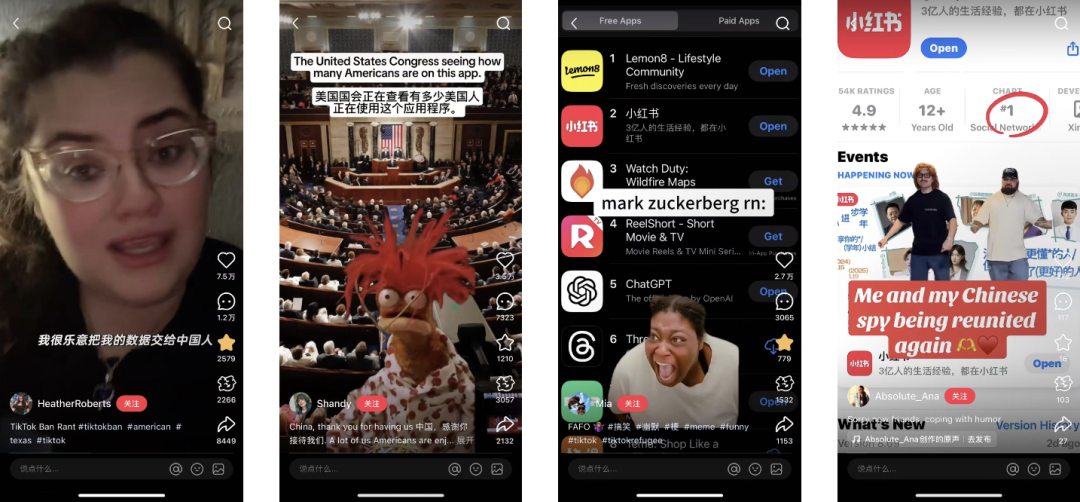
The rebellious mindset of foreign netizens has turned the influx of overseas IPs to Xiaohongshu into a battle between the people and the American government. Migrating TikTok to Canada can only be called a compromise, while directly migrating to another Chinese community is resistance. Nowadays, this act of resistance has gradually evolved into an online carnival involving both Chinese and foreign netizens. For example, the term "Chinese spy," which was an accusation from the American government, has become a nickname for native app users by foreign users, with "My Chinese spy" becoming another trendy expression for "my Chinese friend." Many overseas users also use cat meme images to express their willingness to hand over their data and even hope to become "valuable" users of the platform through consumption.
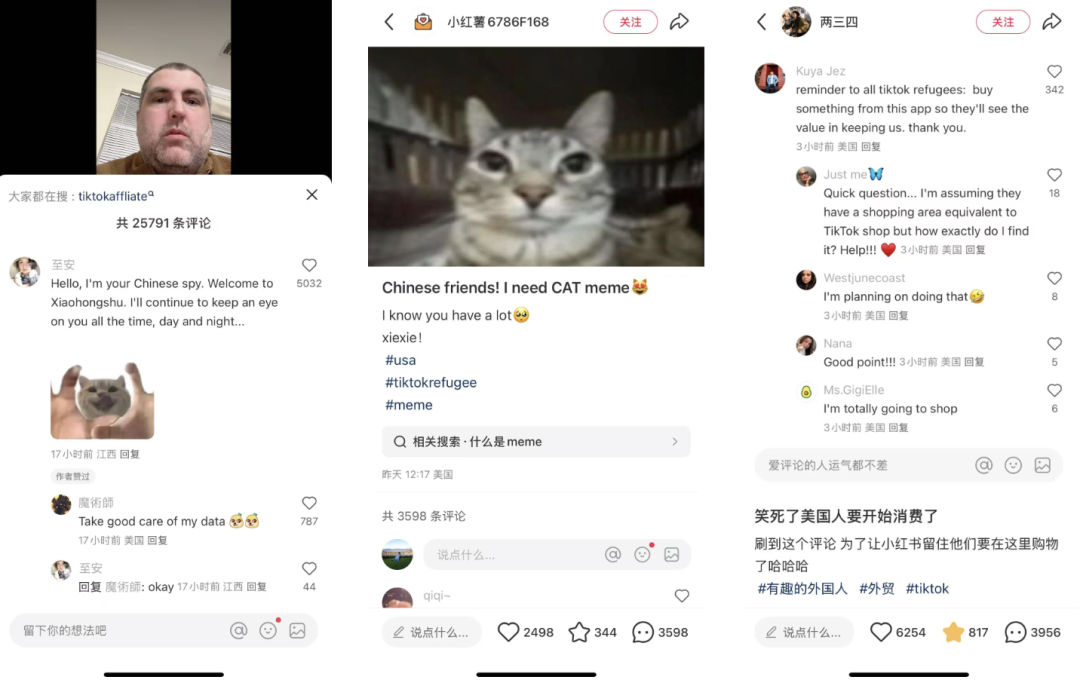
Currently, the reading volume of the hashtag "#tiktokrefugee" on Xiaohongshu is still rapidly climbing. As for how long this migration trend will last, it may depend on whether the TikTok ban on the 19th will take effect.
This uproar also reminds some people of the incident in July 2023 when Twitter's promotion of paid verification led to a large-scale migration of overseas illustrator bloggers to Weibo. At that time, Twitter restricted unverified users to only being able to scroll through 600 tweets per day, while verified users (blue tick users) could read 6,000 posts per day. This policy led to a significant decline in the popularity of many illustrators' works. To maintain their exposure and interaction with fans, they flocked to Weibo to open accounts.
Different backgrounds, similar reasons, but this time it's Xiaohongshu that wins by default. TikTok has 170 million monthly active users in the United States, with young people aged 18-29 making up nearly 60% of its user base. Xiaohongshu currently has over 300 million monthly active users, with over 60% of them being under 30 years old, resulting in a highly overlapping user age structure between the two platforms. This also explains why some American TikTok users, when trying to migrate to other social media platforms in their country, would complain that the jokes and memes on those platforms "are too old, from five years ago."
Xiaohongshu unexpectedly received a massive influx of traffic, which also reminds people of Kuaishou, which ventured into brand internationalization earlier. In overseas markets, Kuaishou's brand launch was once very proactive. Starting from 2016, Kuaishou has ventured overseas five times, with its footprints spanning the Middle East, Latin America, and Southeast Asia, but the first four ventures were not smooth.
It was only on the fifth overseas venture in 2022 that Kuaishou achieved some success in the Brazilian market. As of the third quarter of 2024, Kuaishou had over 60 million monthly active users in Brazil. However, this time around, when TikTok stumbled, Kuaishou's overseas version did not benefit. Ultimately, it is due to the age of users and the tone of content.
Xiaohongshu has been focusing on overseas Chinese and international students. Malaysia, Singapore, the United Kingdom, Canada, Australia, and the United States are key countries for brand placement. Before this wave of migration, Xiaohongshu had already experienced several small waves of foreigners "following the trend." A typical example is "listening to advice." Many foreigners post their attire on Xiaohongshu, asking Chinese netizens for advice on improving their image. It can be said that this large-scale migration to Xiaohongshu is closely related to these earlier small waves.

The addition of a large number of new users has also sparked new discussions and reflections on Xiaohongshu's commercial value. As early as April 2021, there were rumors that Xiaohongshu planned to go public in the United States around the middle of the year, but Xiaohongshu did not comment on the rumors at that time. Subsequent reports by Bloomberg stated that Xiaohongshu had suspended its plans to go public in the United States. Regardless of how much traffic Xiaohongshu can ultimately receive, its sudden increase in popularity will bring new opportunities to its listing plans. In China, multiple Xiaohongshu concept stocks have soared since January 14th, with increases exceeding 10%.
Four Essentials for Foreigners to Gain Followers: Looks, Talent, Humor, Nature
Unlike the previous wave of anime illustrators who migrated to Weibo, the overseas users flooding into Xiaohongshu this time are more ordinary people. Among them are farmers, nurses, couriers, students, construction workers, lumberjacks, and stay-at-home moms. Most of them have ordinary occupations and looks. While some of their videos have received high praise, many videos have stayed at single-digit likes and zero comments.
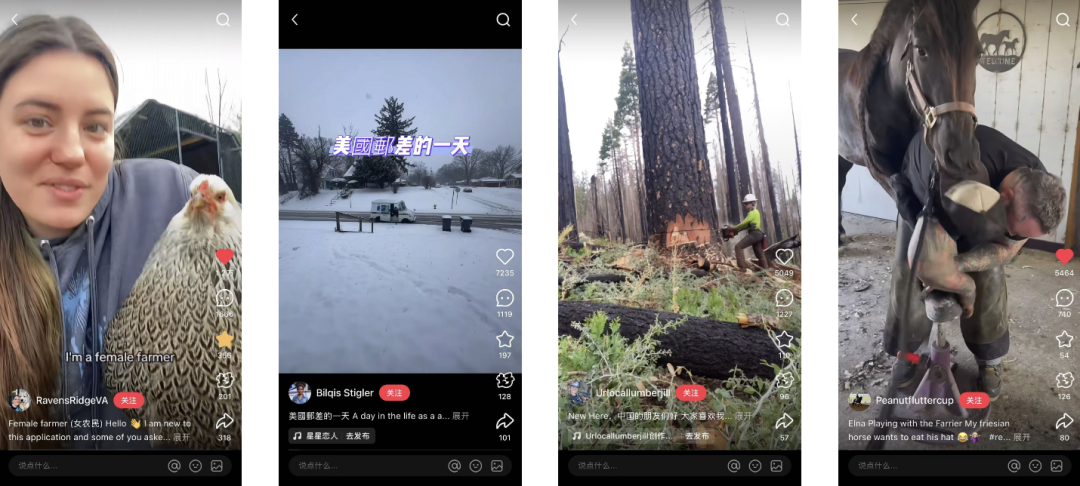
Initially, most foreign users' videos did not have subtitles, and some began to learn to add English or bilingual subtitles. A highly praised video from a foreign friend adopted a more modern approach, using a translation software to convert English into Chinese and then recording the machine's Chinese pronunciation, thus completing his first greeting video on Xiaohongshu. Some bloggers mentioned in their introduction videos that they previously had a large number of followers on TikTok and were full-time TikTok bloggers, but the ban forced them to find another community to rebuild their fan base. From the fluent expressions of these foreign users, one can also sense their proficiency in operating social media accounts.
Those who are more likely to receive high praise are those with prominent characteristics and traits. For example, users with high looks or talent. Some art creation bloggers quickly gained thousands of followers. Previously, fans of niche content "ate from the handouts" mainly through reposting, but now that it is within reach, they exclaim that they are overwhelmed with happiness. In the comment sections of some musical instrument playing and painting videos, Chinese netizens also played with the "Empresses in the Palace" meme, commenting: "Those who come with talent, stay, and bestow perfume pouches." Meanwhile, some bloggers with model-like faces and figures have received a lot of teasing and declarations of love. Beautiful women, handsome men, cute kids, and cute pets constitute the most popular content topics that overseas users are most likely to receive likes for.
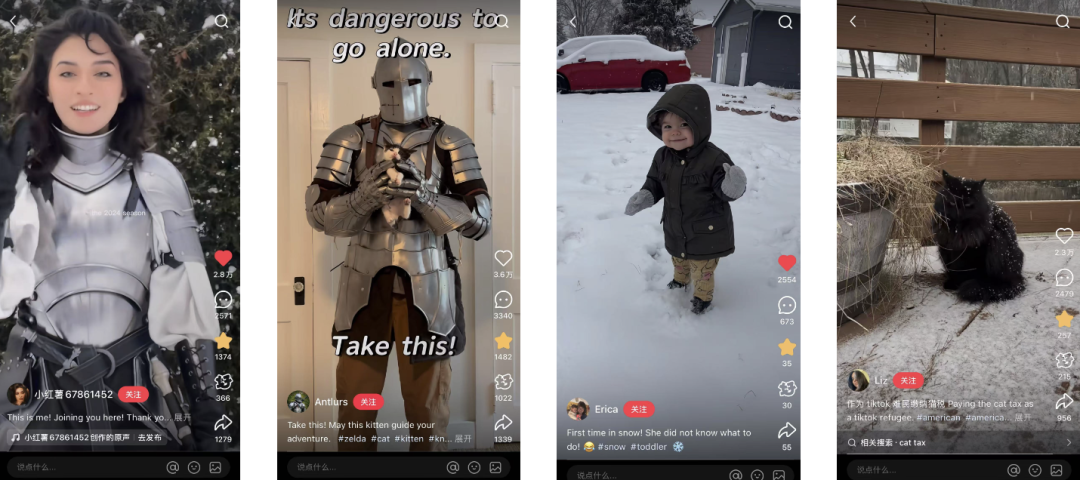
Xiaohongshu users quickly discovered that the current "flooding" of foreign users on the Chinese internet is not due to the cliched narrative of "foreigners falling in love with China" with exaggerated performances. Rather, it is a tangible result of the collision of cultures and living habits, producing amazing chemical reactions and sparking new popular topics.
Almost every comment section of foreign movies, TV shows, and talk shows can see some foreign IPs expressing shock. Clips from "Modern Family" seem to be favored by the algorithm. When an American netizen expressed shock, saying, "You also watch Modern Family?", Chinese netizens in the comment section replied, "Are you kidding? They are my American relatives."
There were also questions from American users about "European and American repost bloggers," to which Chinese netizens enthusiastically explained that this blogger had been making such videos for several years or believed that adding Chinese subtitles and the original blogger not being on Xiaohongshu should be considered secondary creation.
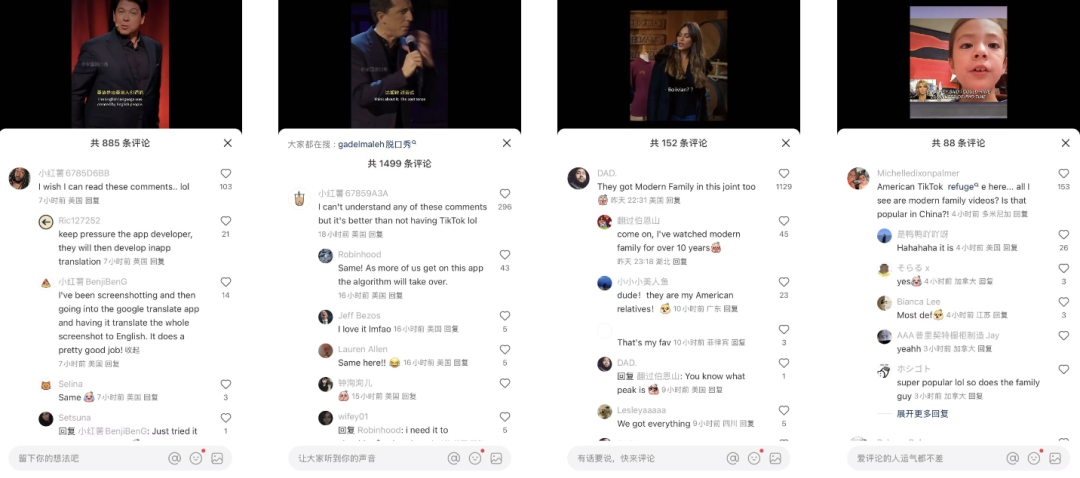
Regarding the current situation of "foreigners coming," most Chinese users can only passively accept it. After browsing a few posts from foreign users, Xiaohongshu's algorithm will soon turn the homepage recommendations into all foreigners. Jingzhe Research Institute clicked into the video stream on the evening of the 13th and refreshed the video for half an hour, only to receive a uniform content recommendation from foreign users. This "unrecognizable" online community experience quickly gave rise to a new meme: "Woke up to find the sky had fallen."
Many people don't understand why these Americans choose Xiaohongshu instead of domestic Douyin or why they don't download an overseas alternative version of TikTok and must mix with Chinese people. In fact, this is due to different registration requirements.
Compared to Xiaohongshu, which allows direct registration with overseas phone numbers, using Douyin and other social media platforms in China requires a domestic mobile phone number for registration. Other reasons include the risk that alternative apps may also be banned. For example, although Lemon8 is a similar overseas application, it is also a product of ByteDance, so there are also concerns about being banned.
Some overseas users have talked about the reasons that attracted them to register in online chat rooms, stating that the interface of the app looks like a combination of Pinterest and TikTok. Some were attracted because they saw Xiaohongshu promotions on Twitter. In fact, it seems that Xiaohongshu's overseas promotions have also accelerated recently. Firstly, after the video interface was revamped, it became closer to TikTok's layout. This has made some users who hate the redesign Direct call "Planned in advance" (call it "premeditated").

In addition, Xiaohongshu's international version advertisement on Twitter also unified the app name to Rednote. This name is neither Xiaohongshu, which is commonly used in media reports, nor RED, which was once used for the international version. When searching on the Chinese internet, one can even see many replies from 2023 and 2024 stating that the international version of Xiaohongshu is called Little Red Book.

However, compared to the effects of the brand's proactive promotion, more overseas users seem to have entered Xiaohongshu due to the call of influencers and the resulting chain reaction: First, some people discovered Xiaohongshu, and then their posts on Xiaohongshu received friendly and interesting feedback, so they shared their Xiaohongshu experience back on TikTok, attracting more people to download it. When the trend has formed, "following the trend" becomes a matter of course.
Prosperous Tang Dynasty, Yangwu Movement, Great Unity of Chinese and American Netizens
Regarding the traffic storm stirred up by overseas users on Xiaohongshu, some are delighted, while others are worried.
Some users have expressed dissatisfaction with the phenomenon of foreign users rapidly gaining followers on Xiaohongshu, leaving comments such as "Hi, I'm a foreigner, please help me gain followers quickly" and "Can I quickly start an account by saying I'm white?" Some notes have also sparked discussions: Does the massive influx of foreign users constitute cultural invasion and colonization?
Many international student groups expressed that "the sky has fallen" because Xiaohongshu is the only habitat where they can immerse themselves in the Chinese community overseas. Now, after being exposed to foreigners all day at work or school, they have to face another large group of foreigners when they return to social media.
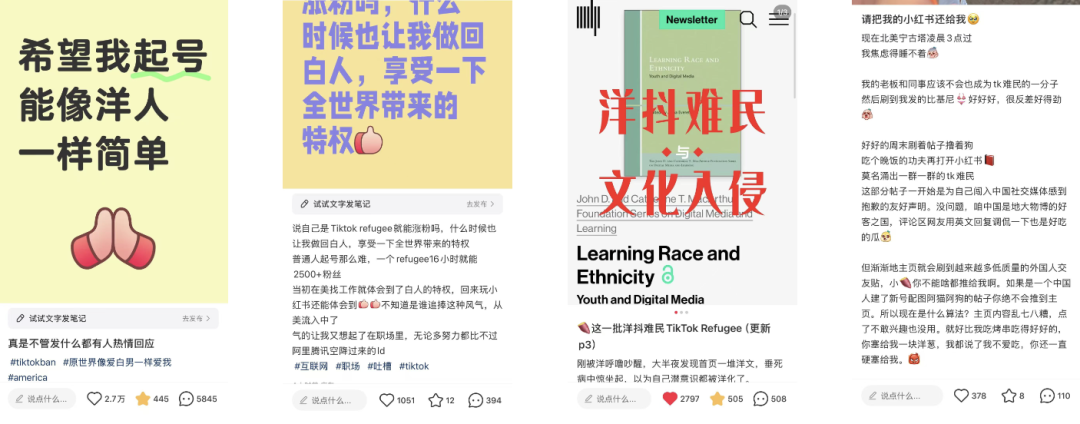
Regarding the rapid growth of followers, some believe that it is not necessarily because Chinese netizens are "fawning on foreigners." Rather, it is due to the special way foreign users play on Xiaohongshu. Most foreign users' first video will mention, "If you're also a TikTok refugee, please follow me." Others invite mutual follows after revealing their identity in the comments: "If you follow me, I'll follow you back." This behavior of emphasizing mutual follows is seen by Chinese netizens as something only middle-aged and elderly users would do.

However, it's not just foreigners who are rapidly amassing followers. Some Chinese users have reported that their accounts have surged with 40,000 followers overnight, thanks to their content being recommended to overseas users. In the comment sections of Chinese users specializing in furniture, food, and traditional Chinese culture, there has also been a deluge of overseas IP addresses.
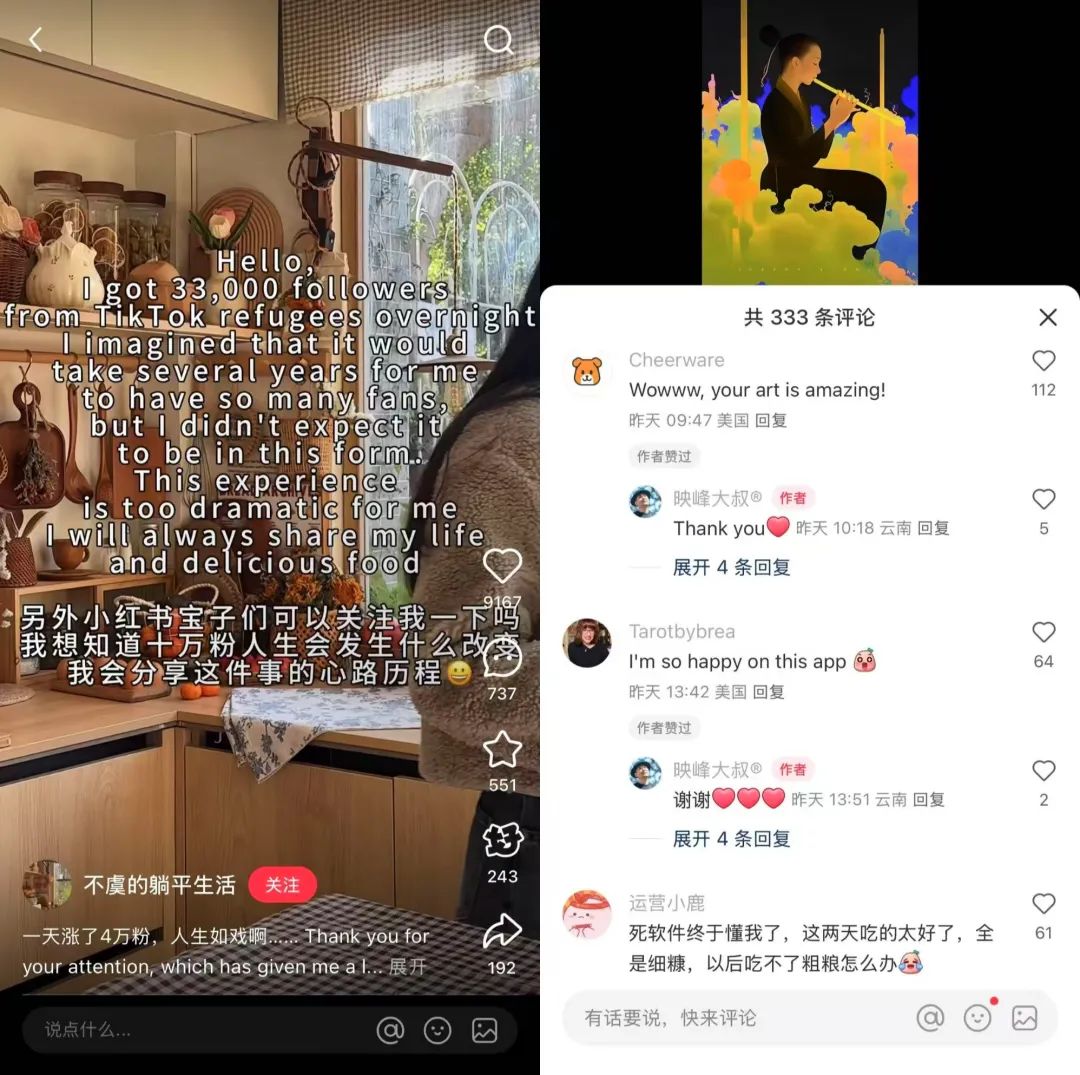
Suspicion and vigilance are not absent. On Xiaohongshu, some American users have earnestly cautioned, "Don't trust Americans; they're here to disrupt the peaceful atmosphere." Others have advocated reporting racially discriminatory comments and messages. Some have even appealed to Xiaohongshu officials, hoping they refrain from introducing a one-click translation feature to preserve their private space with foreign colleagues and clients.
Yet, more individuals have embraced this influx and integration with open arms. A plethora of new jokes have emerged, such as "striking it rich by showcasing foreign things" and "the foreign enlightenment movement." The most prevalent interaction inspiring these jokes is "benefit exchange," which encompasses using foreigners' videos for English listening practice, requesting help with English homework, posting photos of pets and abs, and paying "cat tax," "dog tax," and "abs tax."
Foreign users have reciprocated, seeking assistance with Chinese homework and math problems from Chinese users. At this juncture, humans' penchant for shortcuts, love for animals, and admiration for beauty transcend national borders and time zones, achieving a high level of consensus.
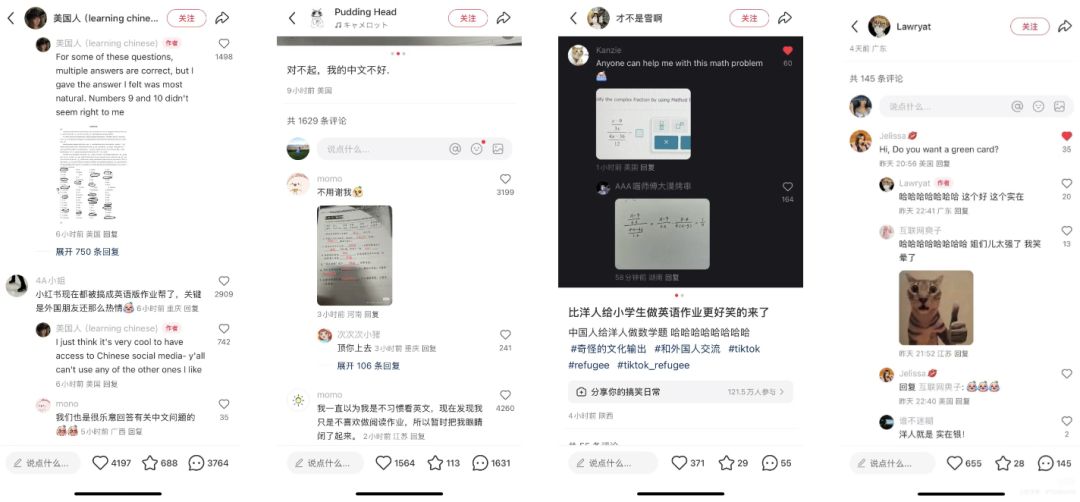
Undoubtedly, the welcoming experience foreign netizens have encountered on Xiaohongshu surpasses the average of today's online communities. When queried about the enthusiasm for these foreign netizens, someone responded: "They posted numerous videos of gardening and farm animals. Do you know how soothing this is for someone living in a bustling urban steel jungle?"
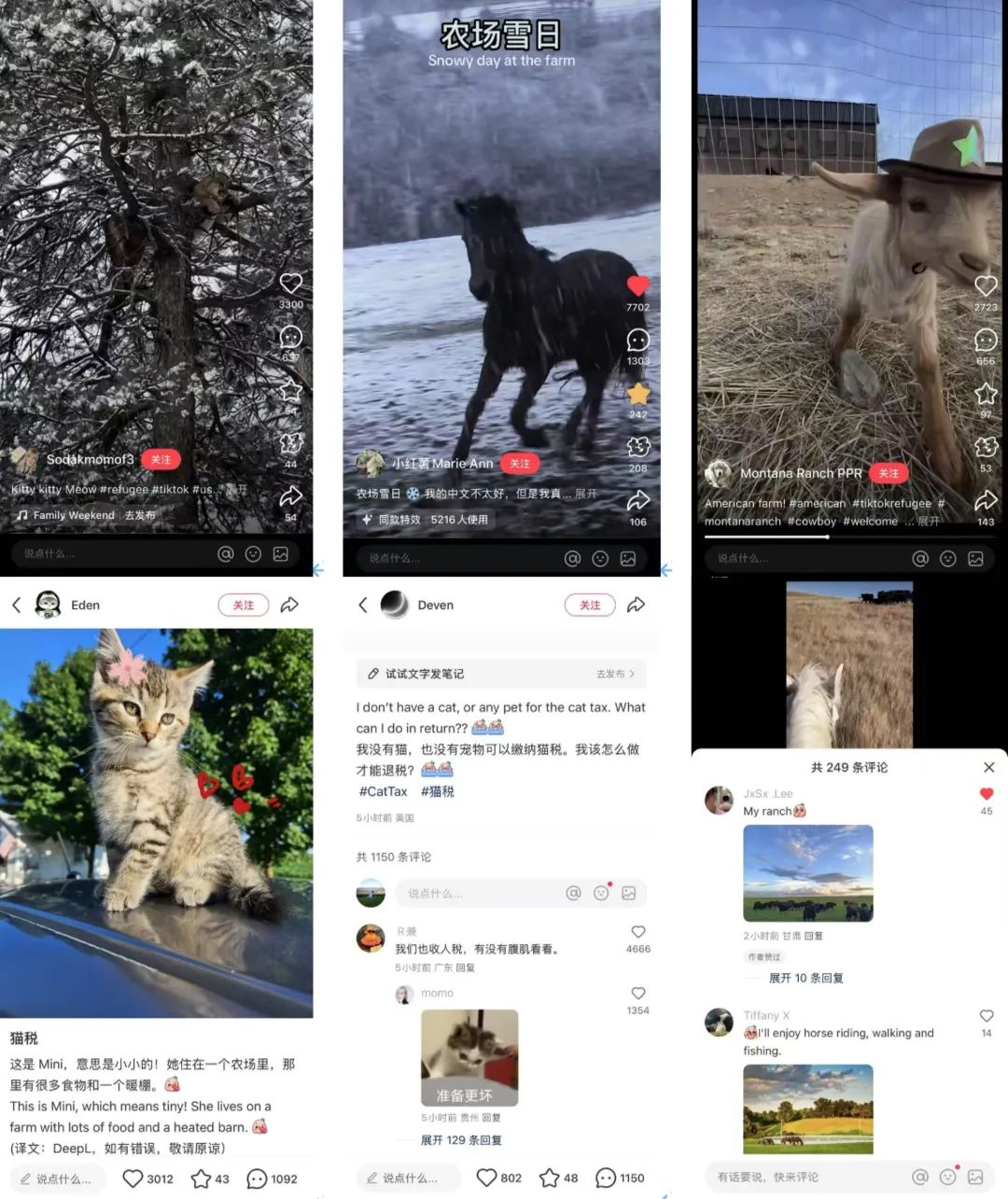
Besides sharing quintessential American farm scenery, you might encounter Americans seeking answers to a wide array of queries, ranging from salaries, education, healthcare, investments, to celebrities, regions, and various hobbies. For instance, someone asked Chinese netizens if they knew Ohio, USA, to which a commenter replied: "I've heard of it, but Florida is more famous." There are also those who fled famous personalities on American social media only to be surprised by the prevalence of Trump, Musk, and others on Chinese internet platforms as well.
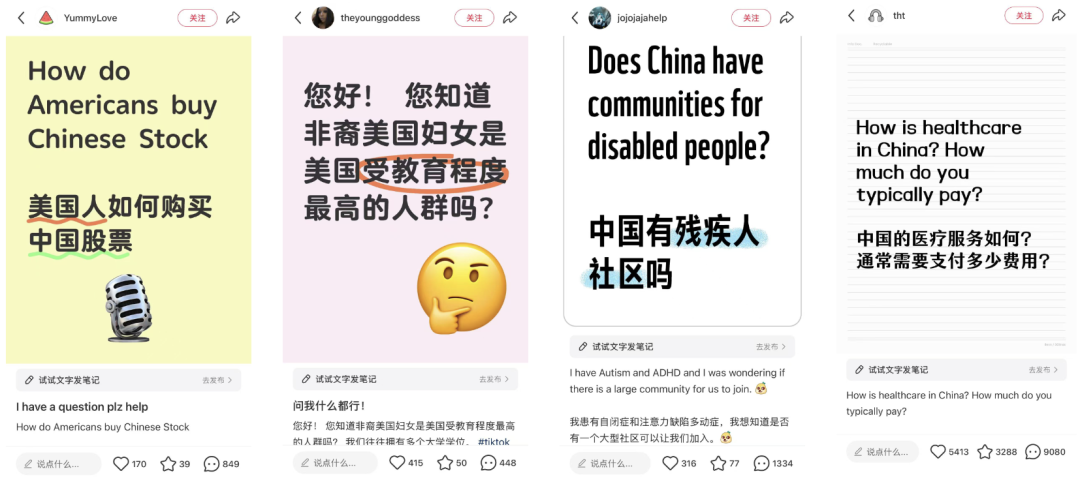
Increasingly, people are sharing their hobbies and cherished life moments. Someone inquired about enthusiasts of clay modeling, crocheting, or cave exploration, prompting Chinese and foreign netizens to showcase their creations in the comments. Others shared their cosplay characters or original artwork, or the rainbow they spotted in the evening or a snowy day.
As these sharers' identities are so ordinary and their content so everyday, it becomes easier to grasp the increasingly overlooked notion that "we are all ordinary people."
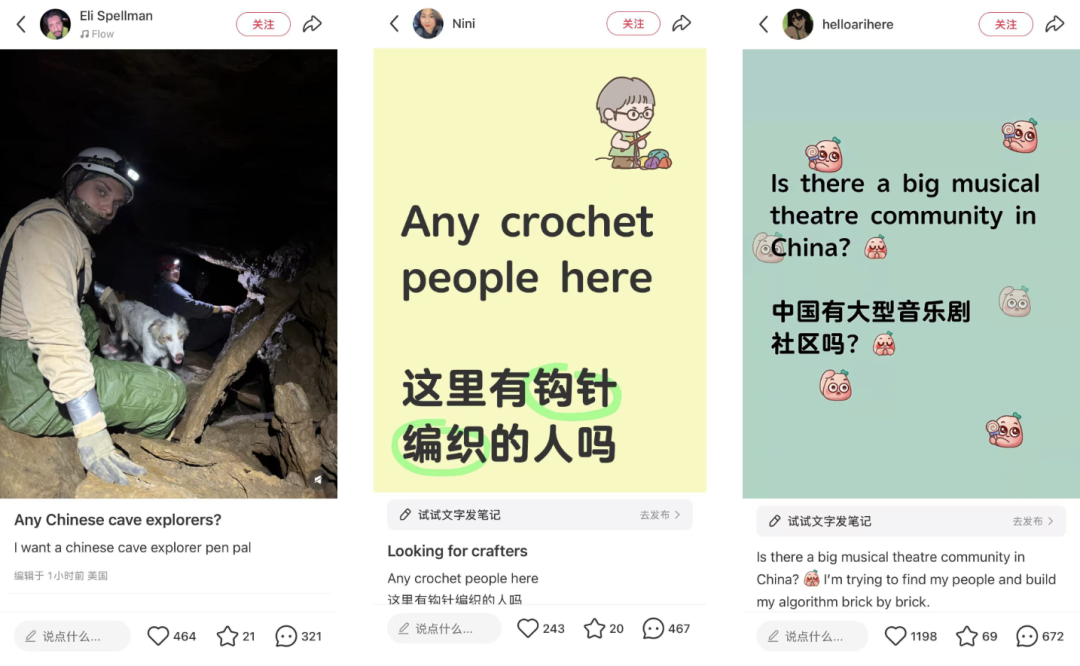
Nevertheless, almost everyone harbors a vague sense that this internet spectacle is fleeting. The registration surge is a trend bound to wane, and the warm camaraderie will gradually fade as it loses its novelty. It might even morph into cyberbullying targeting accounts from specific regions amidst future international conflicts.

However, worrying about such a future is futile. Instead of dwelling on tomorrow's woes, cherish today's joys. A popular internet saying goes: "Life is lived in fleeting moments." If internet life forms part of these moments, then what's significant and memorable might just be these few days. This harmony and delight, this seemingly grand unity between Chinese and American people, is precisely because of its brevity and ephemerality that it makes us smile today.





